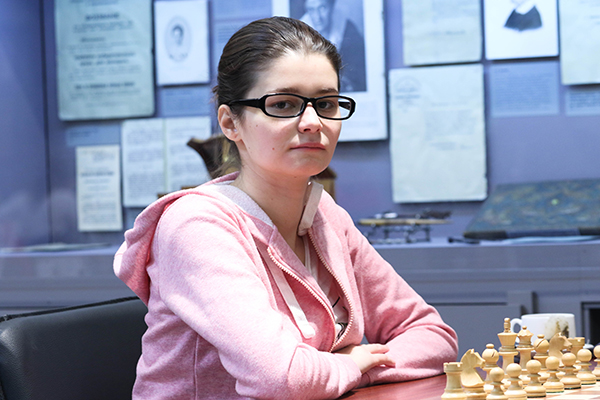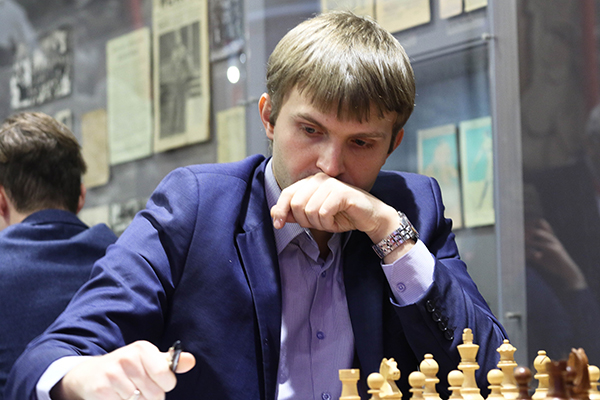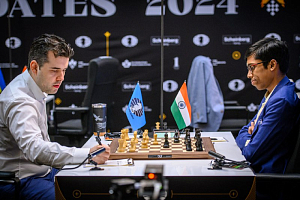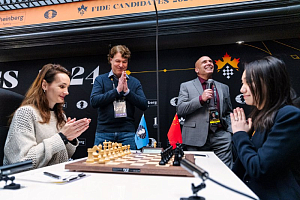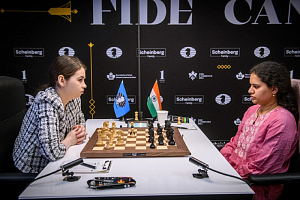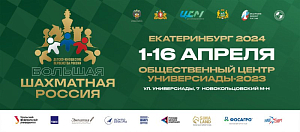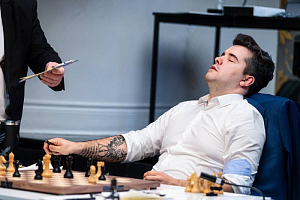The Leaders Aren't Invincible
Superfinals, round 5. Misha Savinov reports from St. Petersburg
In the men's Superfinal, the winning streak of the leader comes to an end, the underdogs continue falling behind, and the only players who win games are former Superfinal champions. Let us examine such sane and logical events a little closer.
Round 5, men
Fedoseev-Inarkiev ½-½, Dubov-Tomashevsky 0-1, Malakhov-Matlakov ½-½, Svidler-Romanov 1-0, Vitiugov-Sjugirov ½-½, Volkov-Riazantsev 0-1.
Current standings:
Fedoseev – 4.5, Dubov – 3.5, Vitiugov, and Svidler – 3, Tomashevsky, Inarkiev, Sjugirov, and Riazantsev – 2.5, Malakhov, and Matlakov – 2, Volkov, and Romanov – 1.
Vladimir Fedoseev vs. Ernesto Inarkiev
Only Ernesto Inarkiev managed to slow down the unstoppable Vladimir Fedoseev. On the first sight the game looks rather nonconfrontational, but the line of the Catalan they played is actually quite topical and often brings White decent results. Judging by distribution of thinking time in the opening, Inarkiev's preparation was the main reason of this game being so bloodless. Kudos to Ernesto! He started to think over his moves only after the game entered an ending with two minor pieces and no weaknesses for each side.
Fedoseev continued to create Black tiny problems, perhaps intending to capitalize on having a bishop against a knight, but mostly just obeying the regulations – there is indeed a rule against draw offers before the move 40. After White advanced his kingside pawns, fixing a weakness on g7 that could be attacked by the bishop, Black switched to active counterplay, abandoning that pawn and breaking in with his king. Fedoseev took on g7, but there was no way to make progress, as the black king arrived to d3, ready to either capture the e4-pawn or help his knight with a perpetual. Hard analytical work and good memory brought this draw home for Inarkiev. And Fedoseev, despite dropping his first half a point, should be more than satisfied by having a full point gap from the second place going into a day off.
Daniil Dubov vs. Evgeny Tomashevsky
The young Muscovite showed his unpredictable side by playing the Vienna. The line he played occurs in some contemporary games and, according to Daniil, often gives White a slight advantage. Evgeny had not prepared the Vienna so deeply for this game of course, so he was just playing moves that looked natural to him and deviated from the opponent's main line early. Already after Black's 8th move Dubov could not remember what he had written in the file.
“White was supposed to be better, I remembered that much, but in the game this evaluation lasted for two moves at most”, said the disappointed Daniil afterwards. Probably his 10th move was already inaccurate, as Black got a very comfortable game after it.
In a position with the opposite side castling White's doubled c-pawns made a potential pawn storm completely inefficient, while Black could easily advance his kingside pawns combining it with other threats. The middlegame looks completely one-sided, and after the black queen's three-move maneuver snatched White's a-pawn, the game was basically sealed. Despite obtaining another semi-open file, White was still unable to create threats on the queenside and had weak position elsewhere. Tomashevsky's technique did not let him down, and after he passed the control, Dubov resigned.
Peter Svidler vs. Evgeny Romanov
Svidler was in a combative mood, opening the game with 1.e4 and opting for opposite side castling against the Paulsen Sicilian, but most of the play took place in the center and did not include threats against kings. White got a slight pressure and then outsmarted Black with move orders during the maneuvering stage, making more useful moves in preparation for his f4-f5 break while preventing Black's freeing d6-d5. After the queens were traded off, Black's backward pawn on d6 fell, and the game entered a technical stage. A very professional effort by Svidler, who returns to +1 and is not totally out of contention for his 8th title. Still, he is not just 1.5 points behind the leader, but will be playing Black in their individual game in the penultimate round, so it is quite a long shot.
Nikita Vitiugov vs. Sanan Sjugirov
During the game both sides thought that White had an advantage, and played accordingly. However, when they came to the press center and clicked a few buttons at chess24 website, they found the game to actually be quite balanced. After Black solved his immediate problems and completed the development by castling long on the 22nd move, White's kingside became weak. Vitiugov attacked on the queenside and even created mating threats, but all of it was basically an active way of defense. Soon Black took a pawn on e3, forcing the opponent to go for the perpetual.
I think both players can be satisfied with their first half of the championship. Vitiugov is at +1 and will be White against both Dubov and Fedoseev, so he has plenty of chances to alter the tournament table to his own liking, and Sjugirov plays quality chess and performs above his rating.
Sergey Volkov vs. Alexander Riazantsev
Once again Sergey Volkov loses as White in the Gruenfeld when his opponent offers him a piece sacrifice. An excellent game by Riazantsev! He may have missed a couple of more forceful ways to win, but the very fact that he got a winning position as Black on the 19th move is quite telling. The 2016 champion is back at 50 percent.
Vladimir Malakhov vs. Maxim Matlakov
The day before both players had good position but lost. Tomorrow there is a day off. Therefore, today they did not feel there was anything to fight for. Both were eager to trade pieces whenever they got a chance, and the game was drawn on the 28th move.
Round 6, women
Bodnaruk-Pogonina 1-0, Galliamova-Girya 0-1, Gritsayeva-Shuvalova 1-0, Gunina-Goryachkina 1-0, Nechaeva-Ovod ½-½, Kashlinskaya-Kovalevskaya 0-1.
Current standings:
Girya, and Gunina – 3.5, Kashlinskaya – 3, Pogonina, Nechaeva, Goryachkina, and Bodnaruk – 2.5, Kovalevskaya, Shuvalova, Ovod, Galliamova, and Gritsayeva – 2.
Alexandra Goryachkina defended quite well without an exchange agstin Valentina Gunina and should have drawn the game if it wasn't for Gunina's magical powers. First Alexandra traded the queens for no real reason, making her defending task harder significantly, and then an incomprehensible rook blunder came. With this victory, Gunina jumped to joint first place with another Olympiad team member, Olga Girya, who tricked Gallamova in the heavy time pressure right before the first control to win the key pawn. Converting it was difficult and took another 40 moves, but in the end the youth prevailed. Alisa Galliamova plays below expectations, but in her defense I must say she is not feeling well. St. Petersburg winter is not the healthiest thing for someone not accustomed to it.
The Oscar goes to Ekaterina Kovalevskaya and Alina Kashlinskaya. Ekaterina showed her attacking side and crushed the leader completely. The thematic King's Indian breaks b7-b5 and f7-f5 are rarely seen to be this powerful in the Nimzo-Indian! White was caught completely unprepared by Black's violence, and the game was basically decided by the move 20.
Photos by Eteri Kublashvili




















